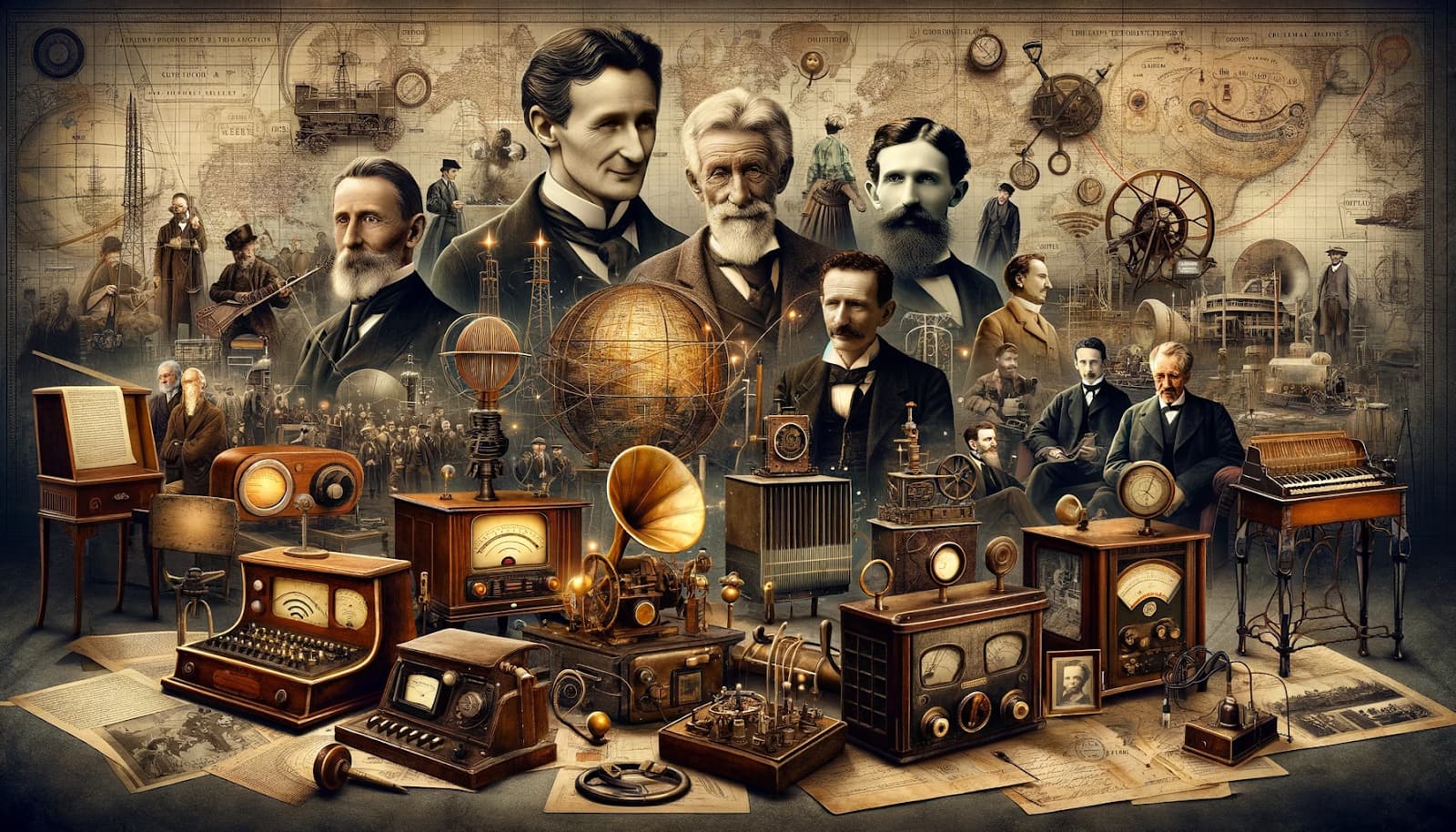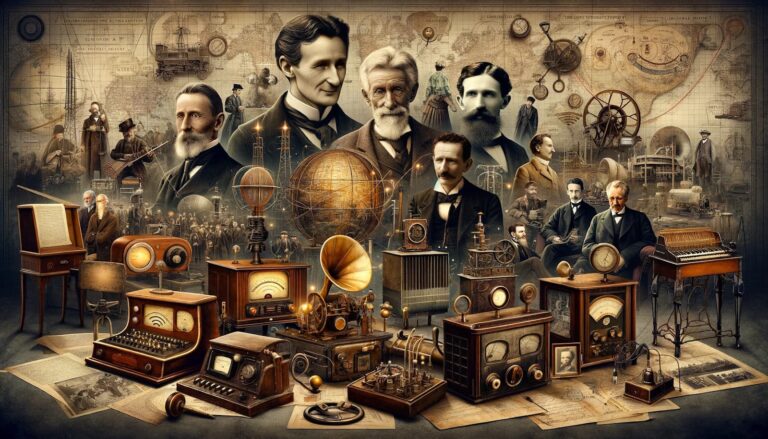The history of radio technology, a vital component of contemporary communication, is rich and complex. It resulted from a synthesis of scientific advancements and discoveries, permanently altering the ways in which people relate to one another. This article explores the history of radio invention, development, and long-term effects on technology and society.
The Pioneers Behind the Invention of Radio
Many important individuals contributed to radio technology as it exists now, each offering their own ideas and insights to the area. The purpose of this section is to give a closer look at the innovators who set the stage for the development of radio.
Guglielmo Marconi: The Father of Radio
- Early Life and Interests: Guglielmo Marconi was born in Bologna, Italy, in 1874. He developed an early fascination in the physical and electrical sciences. His introduction to the writings of physicists such as Heinrich Hertz sparked his interest in the propagation of wireless signals.
- First Wireless Transmission: Marconi achieved successful wireless signal transmission in Italy in 1895, covering a distance of roughly two miles. This experiment was the first to send and receive wireless signals over a significant distance without the need for cables.
- Creating the Wireless Telegraph System: Marconi kept enhancing his design and expanding the wireless communication’s range. He relocated to England in pursuit of a more supportive setting for his studies and growth. He received an English patent for his wireless telegraphy system by 1897.
- Historic Transatlantic Transmission: In 1901, Marconi achieved a major milestone when he successfully sent wireless telegraphy across the Atlantic for the first time, demonstrating the feasibility of long-distance wireless communication.
Nikola Tesla: A Pioneer in Wireless Communication
- Innovative Contributions: Nikola Tesla was a famous inventor and electrical engineer who was born in what is now Croatia in 1856. He had a special interest in wireless technology and made several contributions to the advancement of electrical engineering.
- Tesla’s Research in Wireless Technology: In the late 19th and early 20th centuries, Tesla conducted experiments on wireless lighting and wireless electrical energy transmission. His vision included the potential for wireless communication on a global scale.
- Patents and Controversies: Tesla has a number of wireless communication-related patents. Conflicts over patents resulted from a long-running argument between Marconi and Tesla on the priority of invention. The US Supreme Court maintained Tesla’s radio patent in 1943, rejecting Marconi’s.
Heinrich Hertz: Demonstrating the Existence of Radio Waves
- Basic Experiments: German physicist Heinrich Hertz, who was born in 1857, was a key figure in the creation of radio technology. James Clerk Maxwell’s theory of electromagnetic waves was proven to exist thanks in large part to his tests conducted in the late 1880s.
- The Hertzian Wave: In the lab, Hertz was able to produce and identify electromagnetic waves. These radio waves are employed in wireless communication and were subsequently dubbed “Hertzian waves.”
- Legacy and Impact: Hertz did not personally contribute to the advancement of radio as a means of communication, but his research laid the fundamental scientific groundwork that others, like as Marconi and Tesla, were able to build upon.
The Evolution of Radio Technology
Early Experiments and Theoretical Foundations
- With James Clerk Maxwell’s theoretical prediction of electromagnetic waves in the 1860s, the path towards radio technology was set..
- In the latter part of the 1880s, Heinrich Hertz used laboratory radio wave generation and detection to experimentally verify Maxwell’s theories.
- Later inventors like Marconi and Tesla relied heavily on these early experiments and theories to help them conceptualise and build workable radio systems.
Breakthroughs in Wireless Transmission
- Early on in his studies, Marconi experimented with sending Morse code signals across longer and longer distances.
- When he made his famous transatlantic transmission in 1901, it was the first time radio communication had been established over such a great distance, from Cornwall, England, to Newfoundland, Canada.
- This accomplishment showed how radio has the power to completely transform long-distance communication.
The Impact of Radio on Society
- The Social Effects of Radio: A New Communication Era
The widespread use of radio in the military and on ships during the early 20th century brought about a dramatic change in communication technology. During this time, more rapid and flexible wireless communication replaced more antiquated means of communication like the telegraph and mail. The capacity of radio to send signals fast and far without requiring physical connections transformed the way that operations were planned and information was shared.
- Using Radio During World War I
Radio proved to be a crucial tool for military operations during World War I, particularly when it came to coordinating aerial and naval manoeuvres. Real-time communication between ships, between ships and shore stations, and most importantly, with aircraft — an innovative idea at the time — was made possible by the use of radio. The capacity to communicate quickly and securely was a big help when devising and carrying out military plans, which eventually affected how different operations turned out during the conflict.
- Changeover to Civilian Use
After the war, radio’s usefulness was acknowledged in the civilian world, which prompted a wider acceptance of its usage for public purposes. A pivotal moment in radio history occurred when it was used for civilian purposes instead of just military and marine use. The emergence of commercial radio stations and the start of public radio programming were the two main features of this shift.
- The Initial Commercial Radio Transmission
Pittsburgh, Pennsylvania’s KDKA station broadcast the first commercial radio programme in 1920. The announcement of the U.S. presidential election results in this historic broadcast signalled the start of radio’s use as a medium for information dissemination to a large audience. The construction of more radio stations and the growth of radio programming were made possible by the inaugural broadcast’s popularity.
- The Golden Age of Radio: A phenomenon in culture
Known as the “Golden Age of Radio,” the 1920s to 1940s saw an unheard-of increase in the popularity of the medium. Radio became become a major global source of news and entertainment during this time, drastically altering how people got their information and enjoyment. Radio programming began to diversify during this time, offering a wide range of broadcasts to suit different tastes and interests.
- The Impact of Radio on Home Entertainment
Radio created a new kind of family entertainment by bringing live news reporting, comedy shows, dramas, and music straight into people’s homes. By enabling families and communities to get together around the radio to enjoy listening to their favourite shows, the medium promoted a sense of delight and social participation. During this period, listening to radios together became a common activity and a major part of the social fabric.
- Growth of Global Television
International broadcasting also gained popularity during this time, as networks like the BBC in the UK started offering regular programming to viewers outside of their own countries. The emergence of global broadcasting broadened the impact of radio by permitting the transfer of cultural and educational materials between different countries and regions. This advancement gave listeners a window into the globe and its various cultures while also entertaining and educating them.
Conclusion: Radio’s Timeless Contribution to Communication
The development of the radio over its lifetime is a wonderful story of human cooperation and inventiveness. Radio has continuously changed and prospered, from Marconi’s groundbreaking experiments to the digital revolutions of the twenty-first century. Its status as one of the most important innovations in human history is cemented by its capacity to unite individuals from different countries and cultural backgrounds as well as by its ongoing relevance in a rapidly evolving technology landscape. The history of radio reflects not only the progress of technology but also the enduring human need to connect and communicate, breaking down borders and uniting people worldwide via common knowledge and experiences.















